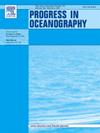Food web analysis shows an exacerbated dependence of zooplankton on detritus in oligotrophic systems due to ocean warming
IF 3.6
3区 地球科学
Q1 OCEANOGRAPHY
引用次数: 0
Abstract
Ocean warming can affect plankton both directly, through altered metabolic activities, and indirectly, modifying the physical–chemical properties of the water column, with possible effects on ecosystem functioning. To evaluate the combined action of warming-related physiological responses and environmental changes on plankton functioning, we carried out a long-term analysis (from 1994 to 2019) of the Bermuda Atlantic Time-series Study (BATS) dataset where ocean warming and stratification have driven a decrease in the net primary production over the last decade. Using the time series of plankton observations, we assembled 1000 replicates of a food web model for each year. We observed that the total flow of matter through the model remained constant over time, despite the increased oligotrophication, due to global warming, after 2014. In fact, the plankton food web remained robust through re-modulated trophic interactions with an increased detritivory to herbivory ratio of the food web over time. However, it was problematic to re-establish the trophic connections of the food web broken by ocean warming, as remarked by the increased relative internal ascendency. Thanks to trophic plasticity, the reduced zooplankton dependence on herbivory was compensated by a significant increase in the reliance on carnivory and detritivores, highlighting the crucial role of trophic interactions in buffering significant environmental short-term changes.

食物网分析表明,由于海洋变暖,在低营养系统中浮游动物对碎屑的依赖加剧
海洋变暖可以通过改变代谢活动直接影响浮游生物,也可以通过改变水柱的物理化学性质间接影响浮游生物,从而可能对生态系统功能产生影响。为了评估与变暖相关的生理反应和环境变化对浮游生物组合功能的综合作用,我们对百慕大大西洋时间序列研究(BATS)数据集进行了长期分析(1994年至2019年),其中海洋变暖和分层在过去十年中导致净初级产量下降。利用浮游生物观测的时间序列,我们每年收集1000个食物网模型的重复。我们观察到,尽管2014年之后全球变暖导致少营养化加剧,但通过模型的总物质流量随时间保持不变。事实上,随着时间的推移,浮游生物食物网通过重新调节营养相互作用,增加了食物网的营养与食草比例,从而保持了强大的生命力。此外,由于全球变暖,很难重建食物网断裂的营养联系(相对内部优势增加)。由于营养可塑性的存在,浮游动物对草食依赖的减少被对肉食性和营养性依赖的显著增加所补偿,这突出了营养相互作用在缓冲重大环境短期变化中的关键作用。
本文章由计算机程序翻译,如有差异,请以英文原文为准。
求助全文
约1分钟内获得全文
求助全文
来源期刊

Progress in Oceanography
地学-海洋学
CiteScore
7.20
自引率
4.90%
发文量
138
审稿时长
3 months
期刊介绍:
Progress in Oceanography publishes the longer, more comprehensive papers that most oceanographers feel are necessary, on occasion, to do justice to their work. Contributions are generally either a review of an aspect of oceanography or a treatise on an expanding oceanographic subject. The articles cover the entire spectrum of disciplines within the science of oceanography. Occasionally volumes are devoted to collections of papers and conference proceedings of exceptional interest. Essential reading for all oceanographers.
 求助内容:
求助内容: 应助结果提醒方式:
应助结果提醒方式:


